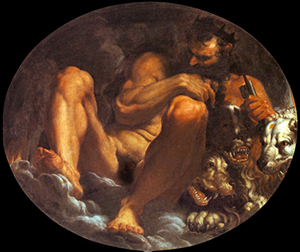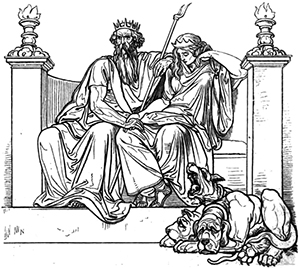 As I wrote the stories in my Hades Cycle, I found myself researching quite a few of the details. I knew the basics, having read and re-read the myths of the ancient Greeks from childhood on.
As I wrote the stories in my Hades Cycle, I found myself researching quite a few of the details. I knew the basics, having read and re-read the myths of the ancient Greeks from childhood on.
(I remember being particularly intrigued in my young adulthood by some modern explorations of the mythology: Goddesses in Everywoman by Jean Shinoda Bolen, Amor and Psyche by Erich Neumann, and Till We Have Faces by C.S. Lewis.)
But I have a poor memory for details (and some details were unknown to me), so I went digging.
Most of the Greek gods had multiple names, and some even a multitude. Many of them derived from the unique cultural references found in different geopolitical regions, such as Aricina, a name for Artemis from the town of Aricia in Latium.
But Hades, the god of the underworld, seemed to possess more names than any of his cohorts. Since Hades is the hub around which the entirety of my Hades Cycle revolves, his names pulled in a considerable portion of my attention. It was interesting stuff, so I’m going to share some of it with you.
Two sources seem to provide the majority of Hades’ names:
1•The change of language and culture through time, and
2•The creation of oblique epithets by people reluctant to pronounce Hades’ proper name.
I’ll explore both.
Hades through Time
The earliest form of the name was the proto-Greek Awides or Aides, dating from the late Neolithic period, 7000 BCE to 4500 BCE. Some later poetic variations may derive from that early form: Aidoneus, Áïdos, Áïda, and Áïs. The later Etruscan variant bears a superficial resemblance as well: Aita.
By classical times (510—323 BCE), the god’s name had settled to Háides, and thus it remained in Greece. This is the basis of our own anglicized Hades.
But while the Greeks recognized Háides as the god’s proper name, they spoke of him as Plouton or Ploutos (“wealthy”), and it was Plouton who was adopted by the ancient Romans as the god who both ruled the underworld and who distributed the riches from below ground. Variants on Plouton included Ploutodótes and Ploutodóter, “giver of wealth.”
Interestingly, Hades as Ploutos was given a priestess in Greece. He’d not received religious observance before, being deliberately ignored because of his connection with death.
But, moving on through time . . . we come to Orcus and Dís Pater.
Orcus was an Etruscan god, ruler of the underworld (like Hades) and punisher of broken oaths, who propagated into ancient Roman beliefs.
Dís Pater (“father of wealth”) was a Roman god presiding over fertile agricultural land and mineral wealth from below the soil. He was also called Rex Infernus (“king below”).
Just as happened in Greek culture, the Romans eventually conflated the two—Orcus and Dís Pater—but then blended them into the Greek Plouton to yield Pluto.
In both Greek and Roman culture, the underworld took its name from its ruler rather than the other way round, giving us Hades in Greece and Dís in Rome.
Just to gather them all in one place, here’s a list of all these historical names:
 Awides
Awides
Aides
Aidoneus
Áïdos
Áïda
Áïs
Aita
Háides
Plouton
Ploutos
Ploutodótes
Ploutodóter
Orcus
Dís Pater
Rex Infernus
Pluto
Epithets for Hades
The ancient Greeks, disliking death, avoided speaking Hades’ name. Even though he was not Death personified—that was Thanatos—his role as ruler of the dead in the underworld was too close for comfort. Therefore they devised innumerable alternates.
I’m not going to opine on all I discovered. Instead, I’ll give you a list (which is likely only partial, since the ancients were inventive, and not every variant was recorded):
Adesius, from Latium, meaning “grace”
Agelastus, from his melancholy countenance
Agesilaus, expressive of his attracting all people to his empire
Agetes or Hegetes (“one who conducts”)
Agesander
Agesilaos
Hegesilaus (“the god who carries away all”)
Aidoneos, from confounding Hades with King Aidoneos of the Molossi—Theseus and Pirithous attempted to abduct the king’s daughter, named Persephone
Axiocersus, the shorn god, from the mysteries of the Cabiri
Clymenos (“notorious”)
Polydegmon (“who receives many”)
Eubuleus (“good counsel” or “well intentioned”)
Hesperos Theos (“god of death and darkness”)
Iao, Hades’ name in Clares, a town of Ionia
Moiragetes, guide of the Fates
Ophieus, the blind god of the Messenians; derived from the Messenian practice of dedicating certain blinded augurs to him
Zeus Eubouleus
Zeus Katathonios (“Zeus of the underworld”)
Zeus Meilichios (“easy to be entreated,” a euphemism for Maimaktes, “the raging one, thirsty for blood”)
In Latin or Etruscan:
Altor, from alo (“to nourish”)
Februus, from februa, signifying the sacrifices and purifications of funeral rites
Feralis Deus, the cruel god
Lactum, from Sarmatia
Larthy Tytiral, from Etruria (“sovereign of Tartarus”)
Mantus or Manus, diminutive of Summanus, Etruscan
Niger Deus, black god
Opertus (“the concealed”)
Profundus Jupiter (“deep Jove”)
Quietalis, from quies (“rest”)
Rusor
Salutaris Divus, when Pluto restored the dead to life with drops of nectar from his urn
Saturnius, from his father Saturn
Soranus, his name among the Sabines
Stygius, from the river Styx
Summanus, from summus manium (“prince of the dead”)
Tellumo, derived from the treasures which Pluto possesses in the recesses of the earth
Uragus
Urgus, from urgeo (“to impel”)
In Egypt:
Amenthes, from the doctrines of the metempsychosis, signifying the “place which gives and receives,” from the belief that some vast gulf served as a reservoir of souls who arrived there upon death and in time departed to animate the newly born
That is one long list, isn’t it!
In my Hades Cycle, I chose always to refer to the underworld as Hades and to the god as Dís. Although, when I reached a story featuring mortals, I felt that Dís was too culturally wrong and branched out to Dís Plouton. 😉
If you’d like more about the lore and background of The Hades Cycle, see:
The Reputation of Dís
A Hero in Hell
